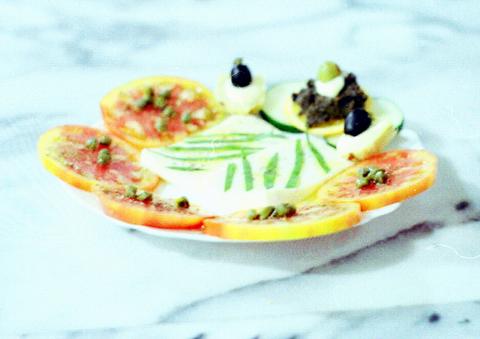Most people concur that the Hualien-Taitung Highway is the most breathtaking stretch of road in Taiwan. On one side are the crystal clear waters of the Pacific and on the other is a dramatic range of steep, lush mountains that burst almost vertically out of the sea. Why this area has not yet been developed into the Riviera of Asia is a complete mystery.
There is one spot along the highway, however, that will remind visitors of the ritzy Mediterranean coast and that is Zorba Garden located about 10km north of Taitung City. Most restaurants along the coastal highway are of the fish-tanks-out-front, plastic-stools-inside variety, but Zorba is something entirely different. It is classy, romantic, serves excellent Italian food and is the most delightful respite from high-decibel, fried-food eating halls.
The restaurant is the brainchild of Tuscan-native Andrea Tognocchi and his wife Jenny Hu (

PHOTO: MAX WOODWORTH
And then there's the food, which will transport the mind to the Tuscan coast even quicker than will the sea breeze or the tasteful architecture. Start a meal with a refreshing Caprese salad, a green salad or a selection of gnocchi. For a main dish, the choice widens to include pasta favorites, like spaghetti with a range of sauces, ravioli and generous portions of oven-baked meat and vegetarian lasagna. There are three different cuts of steak and a delicious baked chicken, or for diners with smaller appetites there are several panini.
"I learned these recipes from my grandmother growing up in Italy. Every family has their own recipes, so these are our family's recipes. I've made a few changes here and there too," Tognocchi said, adding that the team of three cooks to whom he's passed down his culinary knowledge can now prepare the dishes even better than he can.
It would be a crime to have a meal at Zorba without trying the tiramisu, or without washing it all down with a nice glass (or bottle) of wine. Choose from Spanish, French or South African varieties.
Travelers with a taste for Italian food must add Zorba to the list of places not to miss because spots as nice and relaxing as this are few and far between, even in picturesque Taitung.

On April 26, The Lancet published a letter from two doctors at Taichung-based China Medical University Hospital (CMUH) warning that “Taiwan’s Health Care System is on the Brink of Collapse.” The authors said that “Years of policy inaction and mismanagement of resources have led to the National Health Insurance system operating under unsustainable conditions.” The pushback was immediate. Errors in the paper were quickly identified and publicized, to discredit the authors (the hospital apologized). CNA reported that CMUH said the letter described Taiwan in 2021 as having 62 nurses per 10,000 people, when the correct number was 78 nurses per 10,000

As we live longer, our risk of cognitive impairment is increasing. How can we delay the onset of symptoms? Do we have to give up every indulgence or can small changes make a difference? We asked neurologists for tips on how to keep our brains healthy for life. TAKE CARE OF YOUR HEALTH “All of the sensible things that apply to bodily health apply to brain health,” says Suzanne O’Sullivan, a consultant in neurology at the National Hospital for Neurology and Neurosurgery in London, and the author of The Age of Diagnosis. “When you’re 20, you can get away with absolute

May 5 to May 11 What started out as friction between Taiwanese students at Taichung First High School and a Japanese head cook escalated dramatically over the first two weeks of May 1927. It began on April 30 when the cook’s wife knew that lotus starch used in that night’s dinner had rat feces in it, but failed to inform staff until the meal was already prepared. The students believed that her silence was intentional, and filed a complaint. The school’s Japanese administrators sided with the cook’s family, dismissing the students as troublemakers and clamping down on their freedoms — with

As Donald Trump’s executive order in March led to the shuttering of Voice of America (VOA) — the global broadcaster whose roots date back to the fight against Nazi propaganda — he quickly attracted support from figures not used to aligning themselves with any US administration. Trump had ordered the US Agency for Global Media, the federal agency that funds VOA and other groups promoting independent journalism overseas, to be “eliminated to the maximum extent consistent with applicable law.” The decision suddenly halted programming in 49 languages to more than 425 million people. In Moscow, Margarita Simonyan, the hardline editor-in-chief of the